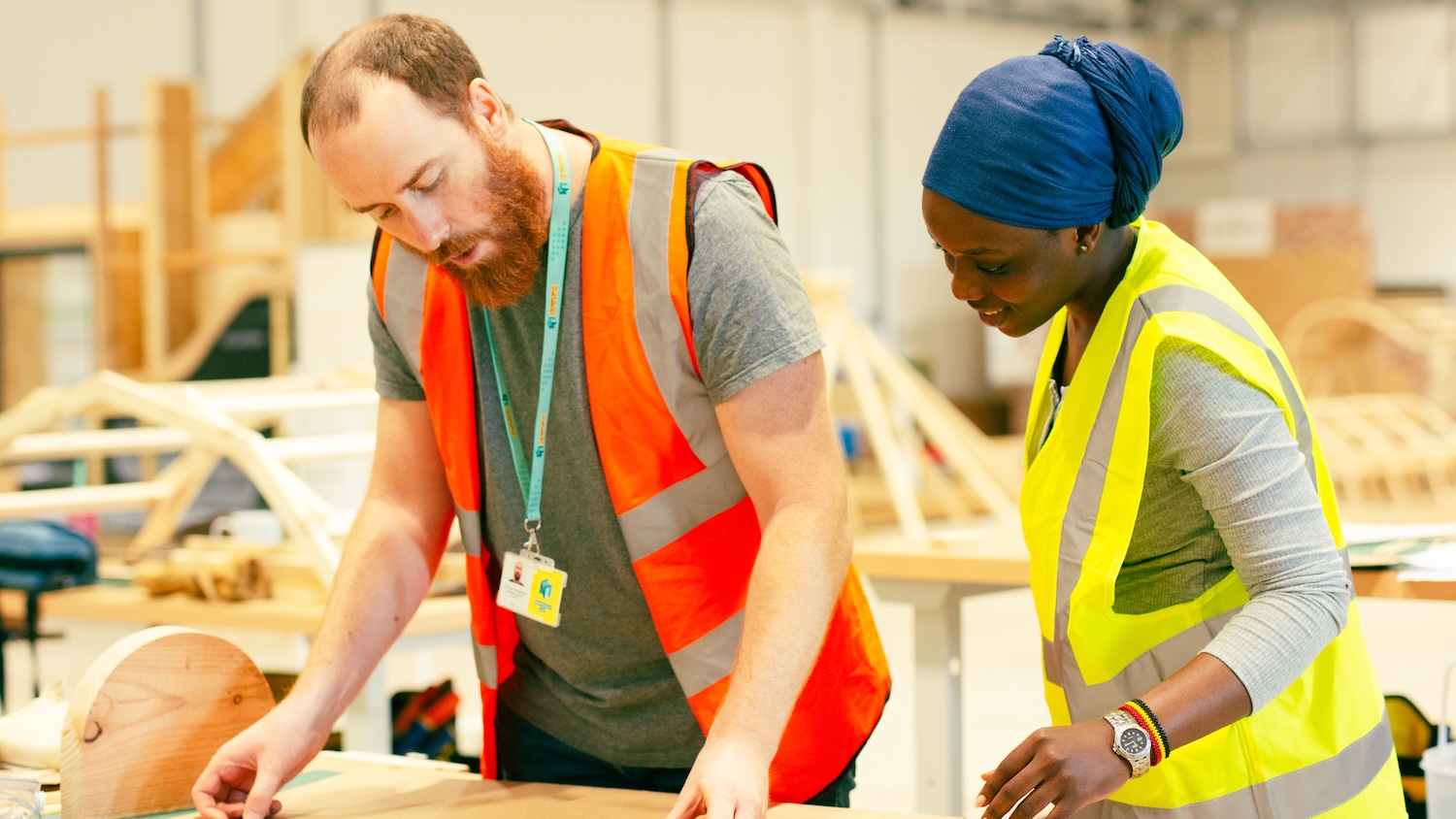
T-Levels: a vocational route into construction
Bowmer + Kirkland’s Emma Hibbert tells CIOB People how T-Level students can help the industry address long-term skills gaps
A new qualification is changing the game for the construction industry.
An alternative to A-Levels and other 16 to 19 courses, T-Levels focus on vocational skills and can help students into employment, further study or apprenticeships.
One T-Level is broadly equivalent to three A-Levels and includes an industry placement lasting at least 45 days.
Emma Hibbert, senior quantity surveyor at construction firm Bowmer + Kirkland, is involved in the company’s work with T-Level placement students.
Hibbert believes the qualification is “a great alternative” to the more traditional routes into construction – and over the past five years Bowmer + Kirkland has welcomed more than 70 placement students.
“T-Levels are more occupation-based compared with A-Levels, so they fit in well within the construction industry,” Hibbert says. “They give students the practical skills they need in the workplace rather than just the academic skills.”
Collaboration
There are more than 20 T-Level subjects to choose from, which offer options to specialise, as well as the industry placement. Construction T-Level subjects include building services engineering for construction; design, surveying and planning for construction; and onsite construction.
T-Levels were designed with businesses themselves – and Hibbert was part of a trailblazer group of local companies that worked with Derby College to develop its T-Level offering.
“We worked closely with them to say, ‘Yes that would work’ or ‘We wouldn’t be able to achieve that on work placements’,” Hibbert explains. “So, we were giving them the feedback as they were writing the T Levels.”

We’ve worked hard to ensure that while they’re with us they don’t just sit twiddling a pen, they learn something and go back to college with that extra experience
As such, Bowmer + Kirkland has developed an approach to placements that means students have a worthwhile experience.
“It’s a lot harder to understand a drawing in a book than to see it out on site,” Hibbert says. “We can offer that bit of information that will help them with their studies and help them understand whether it’s the right career for them.
“Students go back to college with a clearer understanding. We’ve taken them to site, so they’ll have seen the steel frame going up on a project or the groundworks happening.”
Moving the industry forward
Many employers retain T-Level placement students on completion of their course and support progression within their business onto an apprenticeship or into another role.
It’s an approach that can “help the industry move forward”, according to Hibbert. The construction-specific T-Level subjects are all “natural progressions” into university level apprenticeships, so provide a “good grounding to start the next level of training”.
In addition, from an employer’s perspective, T-Level students can be better prepared in comparison with those studying A-Levels.
Hibbert explains: “Because T-Levels are more specific to the job roles, students tend to have a better understanding of what they’re coming to do.
“Therefore, we’ve seen fewer students come in for the wrong job role. Understanding of the job role is key for natural progression.”
This understanding is also important to ensure students are exploring the right opportunity for them for the future.
“One of the key things for us is making sure they get the right position to achieve what they want for their qualifications as well as their experience,” Hibbert says.
‘A natural development’
Before engaging with T-Levels, Bowmer + Kirkland used to take on BTEC students for work experience. This meant working with T-Level students was “a natural development”, according to Hibbert.
The firm has sites across the country and works with local colleges in different areas to help students achieve their 45-day placement. Some students undertake one day a week during term time, while others do week-long blocks during reading weeks, for example.
“Ideally we put them on a project where we have a trainee they can learn from,” Hibbert adds. “So, they’ll work alongside our apprentices to gain the knowledge of what it would be like if they came to work for us as apprentices.”
As part of this, Bowmer + Kirkland has developed a comprehensive training plan. Students on week-long placements can work for a week in different departments on a rotational basis if they don’t yet have a preferred area.
Others, who know in which department they would like to gain experience, can spend their whole time there.
“It depends on the individual,” Hibbert explains. “We interview them when they first start and work out [whether] what they want to do on their placement is something we can achieve. Then we’ll assign them a mentor and they’ll work with that same person for familiarity.”
Key challenges, according to Hibbert, have been finding the right students for the right positions and establishing an effective system when initially preparing to take on T-Level students on a regular basis.
“But because we were used to having high numbers of work experience students and apprenticeships in the business, it wasn’t a major change to us, it was just a development,” she says.
Top tips for construction firms
Emma Hibbert share’s her advice for construction companies taking on T-Level students.
- Be organised and prepared
Make sure students have a good mentor, someone who is prepared to dedicate the time to help them. It’s time-consuming, it’s something you have to do on top of your normal job, but it’s that benefit of giving back. - Put students at ease
We make sure they’ve got a desk, a laptop, a space, so they feel part of the team, which they definitely are while they’re here. - Get them involved
We take students to meetings, and they get to see how everyone conducts themselves in the meeting room. It’s those little bits of value that add to their experience for when they go into the world of work. - Celebrate the growth
There’s satisfaction at the end of it, seeing students go away with a smile on their face, knowing what they want to do with their future. That’s part of the achievement of seeing them come and develop and grow while they’re with you.
“They get their induction and we give them the manual, which gives them things to do and targets to achieve while they’re with us. They can then use that to go back to college and apply their studies.
“We’ve worked hard to ensure that while they’re with us they don’t just sit twiddling a pen, they learn something and go back to college with that extra experience.”
Wider industry impact
Overall, Hibbert believes T Levels are “great” for the wider industry.
“A lot of the smaller contractors are now getting involved with the T-Levels as well,” she adds. “It’s been a benefit across the whole industry, not just larger contractors.”
In line with this, the government’s Skills for Life campaign aims to help SMEs understand all the training and employment schemes available to them, including apprenticeships, T-Levels, Skills Bootcamps, HTQs, and numeracy skills programme Multiply.
Employers considering using technical education to hire employees, offer work experience or upskill existing staff can compare schemes here.
In addition, the increased visibility that comes from Bowmer + Kirkland and other companies working with colleges to engage students means more females are taking construction T-Levels and entering the industry.
When Hibbert started out as a trainee with Bowmer + Kirkland, there were only two other female surveyors in the business. In the region she now works in, there are eight.
“The proportion of females in construction is definitely growing. We’ve already had quite a few come through T-Level placements,” she says.
“It’s something that in the past they might not have considered because it wasn’t something they saw themselves being able to do.
“But because female construction workers go into colleges and speak to them, they see that it’s not just men on site, there are lots of women out there as well.”
Success stories
Bowmer + Kirkland is demonstrating the valuable pipeline of talent that construction companies can create through T-Level programmes.
In the past three years, the company has taken on four Derby College students, who are now undertaking apprenticeships.
“They are continuing to develop with us,” Hibbert says. “It’s like a pre-interview for them as well as for us. They get to see what the job is, and we get to see if they’re the right fit for our business.
“We do take on a number of trainees every year as part of natural progression. When I speak to the students, I emphasise to them that if you’re interested and fit into the team well, there is the opportunity for a job at the end of it.”
Comments
Comments are closed.








I can’t keep up – I thought T levels had been scrapped (or is it that they are going to be scrapped?) .
I am sure I heard a month or two ago that The Government had said they are scrapping them.
Hi Steven,
The government has proposed replacing A Levels and T Levels with a new, singular qualification – the Advanced British Standard. However, I believe, the rollout is expected to take a decade.
Kind regards,
Nadine